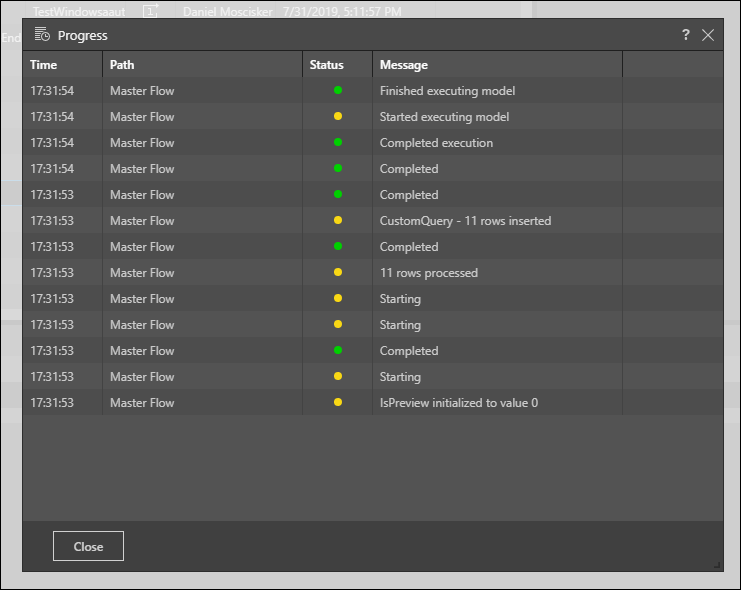The Model Schedules page allows administrators to view and manage all existing model schedules, their associated executions and results.
Admins can access the main schedule listing, the job executions panel and the results (output) panel.
- Use the Task Manager to see a listing of all model tasks in a single listing, without the schedule definitions.
Schedule Listing
Each schedule listed will display:
- Actions: take an action, like stopping or editing the model schedule. See below for details.
- Schedule Name: the name of the schedule job.
- Source: the name given to the model definition file.
- Type: the schedule type (once or recurring).
- Owner: the user who currently owns the schedule job.
- Start Date: the start date and time of the schedule job.
- End Date: the end date and time of the schedule job (if the schedule was recurring, and an end date was assigned to it).
- Description: the description given to the model definition file.
From the Actions panel of each schedule, admins can:
- Stop Schedule: click to stop the schedule job - it can be restarted if needed. If the schedule type was Once or the schedule has ended, the Stop button will be disabled.
- Start Schedule: click to start a schedule that was stopped. If the schedule type was Once or the schedule has ended, the Start button will be disabled.
- Info Icon: hovering over the icon will show:
- Creation Date: the date and time that the schedule was created.
- Schedule ID: the ID of the schedule job.
- From the action menu:
- Edit Schedule: click to edit the schedule
- Delete Schedule: delete the schedule.
- Got to Item Location: go to publication's location in the CMS.
- Change Owner: change the schedule owner.
- Copy : copy the schedule
- Audit Trail: view the schedule's audit history.
Clicking on the schedule will open the Job Executions panel (see below).
Edit a Schedule
Click the edit icon in the Actions column of the relevant schedule listing to open the Edit Schedule panel:
- Name: name the schedule.
- Description: provide a description.
- ETL Execution Part: execute the master flow, or only the models.
- Override Security: select this option if you want database and data model security set in the Admin console to override security set in the model definition file.
- Schedule: configure the schedule.
Change Schedule Ownership
Change the schedule's owner if the user driving the schedule needs to be changed (or the password reset when using an provided account). Click the Change Owner icon to open the Change Schedule Ownership dialog. The dialog displays the schedule name and the current schedule owner. Select the new schedule owner from the drop down and click Apply.
Job Executions
Click on a model's schedule listing to open a list of that its job executions.
From the Job Executions panel, you'll see a list of results from the execution run. Each job can be re-run, or click the job to open its Output panel:
- Actions: open the job's Progress dialog, or re-run the job.
- Status: the status of the job execution (successful in green, pending in yellow, or error in red).
- Type: the job type.
- Description: the schedule's description.
- Start Date: the start date and time of the job execution.
- End Date: the end date and time of the job execution.

Results & ETL Progress
To access the progress dialog for a given model job, click the "data flow" ETL progress icon from the job's Actions column in the Output panel. The dialog displays each component of the ETL in reverse chronological order.
Each listing displays:
- Time: the time of execution.
- Path: the component of the ETL that was executed.
- Status: the execution status.
- Message: indicates the outcome of the execution.

Schedule Manager Macro Buttons
The macro buttons are available in the top right hand corner of the schedule manager.
- Purge - after selecting one or more schedules using the check boxes, this function will hard-delete the schedule and all its associated content and outputs
- Delete - after selecting one or more schedules using the check boxes, this function will soft-delete the schedule, removing it from the list
- Show Old One-Offs - by default, all one-off schedules are hidden from view except those that have been executed in the last 24 hours. Use this button to see old one-off schedules.
- Show Inactive Recurring - by default, all completed recurring schedules that have ended are hidden from view. Use this button to see expired, inactive recurring schedules.
- Show Deleted -allows managers to view all soft-deleted schedules previously deleted.